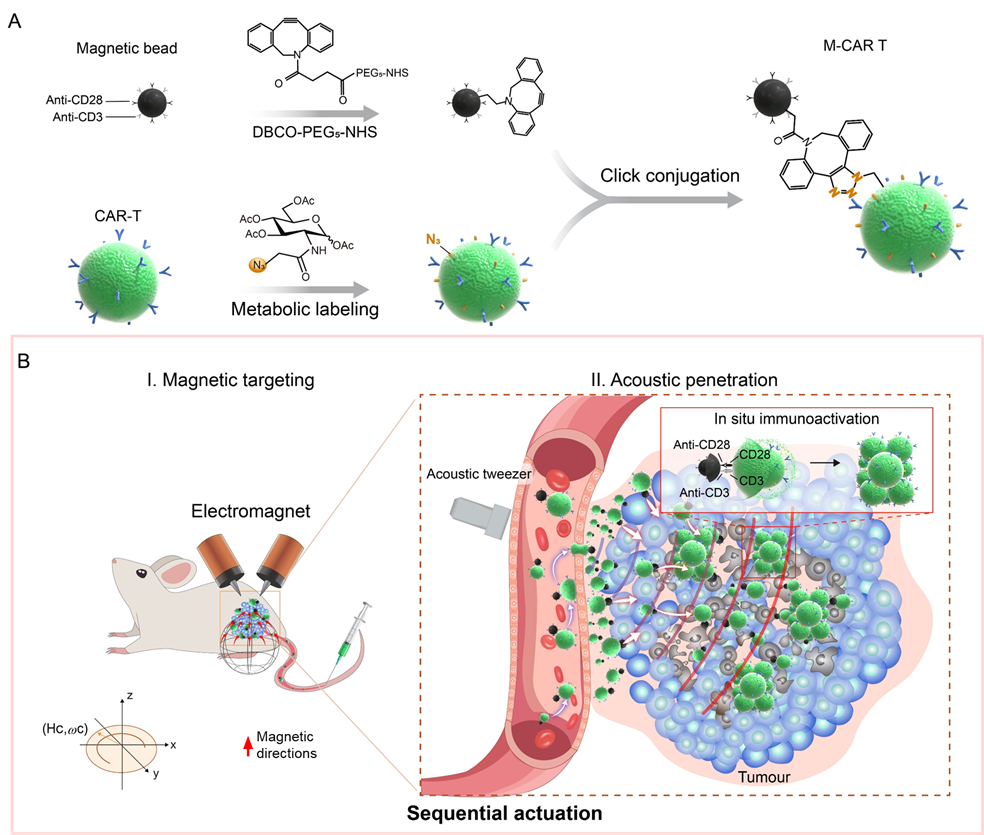Scientists Develop Magnetic-Acoustic Actuated CAR-T Cell Robots for Precision Antitumor Immunotherapy
Date:14-03-2023 | 【Print】 【close】
Although chimeric antigen receptor (CAR) T cell therapy has shown incredible success in the treatment of haematological malignancies, its application in solid tumors is unsatisfactory owing to the harsh physical barriers and immunosuppressive microenvironment. The ideal CAR T therapy will require a novel armored CAR T cell engineered to navigate in the circulatory system, penetrate tumor tissues, and survive in the harsh tumor microenvironment to exert an adequate immune effects.
Recently, a research team led by Prof. CAI Lintao at the Shenzhen Institute of Advanced Technology (SIAT) of the Chinese Academy of Sciences developed a CAR T cell-based microrobot (M-CAR T) with magnetic-acoustic sequential actuation that can autonomously navigate to tumor sites for cell immunotherapy by decorating CAR T with immunomagnetic beads using click conjugation.
The result were published in Advanced Materials on 17 February.
In this strategy, a living CAR T cell microrobot based on magnetic-acoustic sequential actuation for self-controllable targeting and augmented antitumor immunotherapy in solid tumor by artificially decorating immunomagnetic beads via click conjugation. M-CAR Ts are capable of magnetic-acoustic actuation for precision tumour targeting and in-situ activation of antitumor immune responses. Immunomagnetic beads engineered CAR T microrobots (M-CAR T) demonstrated controllable anti-flow and obstacle avoidance movement and maintained an on-demand route under magnetic guidance. Meanwhile, M-CAR T exhibited distinctive acoustic manipulative properties over CAR T cell control and can actively penetrate into artificial tumor tissues under magnetic-acoustic sequential actuation.
"Sequential actuation endows M-CAR Ts with magnetically actuated anti-flow and obstacle avoidance capabilities as well as tumour tissue penetration driven by acoustic propulsion, enabling efficient migration and accumulation in artificial tumour models," said Prof. CAI.
In animal models, sequentially actuated M-CAR Ts achieved long-distance targeting and accumulated at the peritumoral area under programmable magnetic guidance, and subsequently acoustic tweezers actuated M-CAR Ts to migrate into deep tumour tissues, resulting in a 6.6-fold increase in accumulated exogenous CD8+ CAR T cells compared with that with no actuation. “Ingeniously, anti-CD3/CD28 immunomagnetic beads stimulate infiltrated CAR T proliferation and activation in situ, significantly enhancing their antitumor immune efficacies.” said Dr. Pan.
M-CAR T microrobots maintains the bioactive properties of CAR T cells and are capable of magnetic propelled spatial targeting and acoustic actuated tumor penetration to cope with vascular anti-flow and obstacles for migrating into deep tumor. After entering tumor tissues, immunomagnetic beads in-situ stimulated CAR T cells for efficient expansion and activation to overcome immunosuppressive tumor environments.
"Such sequential actuation-guided cell microrobot combines the merits of autonomous targeting and penetration of intelligent robots with in-situ immunoactivation of T cells," said Dr. PAN Hong, the other corresponding author of this study, "and holds considerable promise for clinical precision immunotherapies of solid cancer."

Schematic illustration of magnetic-acoustic sequentially actuated M-CAR T microrobots for self-controllable guidance towards solid tumor and significant immunotherapy. (Image by SIAT)
Media Contact:
ZHANG Xiaomin
Email:xm.zhang@siat.ac.cn